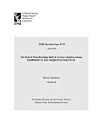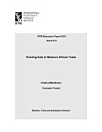Do beliefs about agricultural inputs counterfeiting correspond with actual rates of counterfeiting?: Evidence from Uganda
Ashour, Maha · Billings, Lucy · Gilligan, Daniel · Hoel, Jessica B. · Karachiwalla, Naureen
avq 2016 · IFPRI Discussion Paper Kitab 1 · Intl Food Policy Res Inst
E-kitab
40
Səhifələr
family_home
Uyğundur
info
reportReytinqlər və rəylər doğrulanmır Ətraflı Məlumat
Bu e-kitab haqqında
Adoption of productivity- and income-enhancing agricultural technologies is conspicuously low in Africa south of the Sahara. Farmers’ beliefs regarding the authenticity of agricultural inputs are important for explaining technology adoption: if farmers do not believe that inputs are genuine, they are unlikely to invest in them. The degree of alignment between beliefs about and actual counterfeiting can help explain both the social costs of the “lemons” problem, and low rates of adoption. This is the first paper to explore whether farmer beliefs regarding counterfeiting align with actual rates of counterfeiting, and we do so across a very large geographic area serving tens of thousands of farmers in Uganda using a more precise measure of counterfeiting than many previous studies. We examine the relationship between beliefs and counterfeiting using quantitative measures of farmer beliefs regarding the authenticity of herbicide in their local market as well as a large random sample of laboratory-tested herbicide samples to measure counterfeiting rates in local markets. We report evidence of considerable counterfeiting of herbicides in local markets, with nearly one in three bottles containing less than 75 percent of the labeled concentration of active ingredient. We find evidence that farmers’ beliefs regarding the extent of counterfeiting of herbicide are significantly associated with measures of the actual prevalence of counterfeiting in local markets. These results indicate that farmers are at least partly informed about the “market for lemons” problem in local input markets. However, the results also suggest that although better informed farmers imply a lower social cost of counterfeiting, the high rate of counterfeiting and the relative accuracy of farmer information contributes to low adoption of agricultural inputs in Africa.
Bu e-kitabı qiymətləndirin
Fikirlərinizi bizə deyin
Məlumat oxunur
Smartfonlar və planşetlər
Android və iPad/iPhone üçün Google Play Kitablar tətbiqini quraşdırın. Bu hesabınızla avtomatik sinxronlaşır və harada olmağınızdan asılı olmayaraq onlayn və oflayn rejimdə oxumanıza imkan yaradır.
Noutbuklar və kompüterlər
Kompüterinizin veb brauzerini istifadə etməklə Google Play'də alınmış audio kitabları dinləyə bilərsiniz.
eReader'lər və digər cihazlar
Kobo eReaders kimi e-mürəkkəb cihazlarında oxumaq üçün faylı endirməli və onu cihazınıza köçürməlisiniz. Faylları dəstəklənən eReader'lərə köçürmək üçün ətraflı Yardım Mərkəzi təlimatlarını izləyin.











